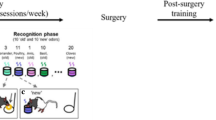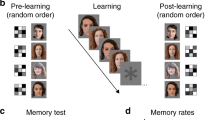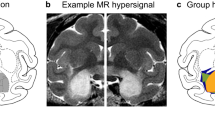Abstract
A major controversy in memory research concerns whether recognition is subdivided into distinct cognitive mechanisms of recollection and familiarity that are supported by different neural substrates. Here we developed a new associative recognition protocol for rats that enabled us to show that recollection is reduced, whereas familiarity is increased following hippocampal damage. These results provide strong evidence that these processes are qualitatively different and that the hippocampus supports recollection and not familiarity.
This is a preview of subscription content, access via your institution
Access options
Subscribe to this journal
Receive 12 print issues and online access
$209.00 per year
only $17.42 per issue
Buy this article
- Purchase on Springer Link
- Instant access to full article PDF
Prices may be subject to local taxes which are calculated during checkout


Similar content being viewed by others
References
Yonelinas, A.P. Phil. Trans. R. Soc. Lond. B 356, 1363–1374 (2001).
Wixted, J.T. Psychol. Rev. 114, 152–176 (2007).
Parks, C.M. & Yonelinas, A.P. Psychol. Rev. 114, 188–202 (2007).
Yonelinas, A.P. et al. Nat. Neurosci. 5, 1236–1241 (2002).
Aggleton, J.P. et al. Neuropsychologia 43, 1810–1823 (2005).
Fortin, N.J., Wright, S.P. & Eichenbaum, H. Nature 431, 188–191 (2004).
Wais, P.E., Wixted, J.T., Hopkins, R.O. & Squire, L.R. Neuron 49, 459–466 (2006).
Eichenbaum, H., Yonelinas, A.R. & Ranganath, C. Annu. Rev. Neurosci. 30, 123–152 (2007).
Squire, L.R., Wixted, J.T. & Clark, R.E. Nat. Rev. Neurosci. 8, 872–883 (2007).
Giovanello, K.S., Keane, M.M. & Verfaellie, M. Neuropsychologia 44, 1859–1865 (2006).
Quamme, J.R., Yonelinas, A.P. & Norman, K.A. Hippocampus 17, 192–200 (2007).
Birrell, J.M. & Brown, V.J. J. Neurosci. 20, 4320–4324 (2000).
Reinitz, M.T. & Alexander, R. Mem. Cognit. 24, 129–135 (1996).
Eichenbaum, H. in Memory Systems 1994, (eds. Schacter, D.L., Tulving, E.) 147–202 (MIT Press, Cambridge, Massachusetts, 1994).
Saksida, L.M., Bussey, T.J., Buckmaster, C.A. & Murray, E.A. Cereb. Cortex 17, 108–115 (2007).
Acknowledgements
We thank C. Ergorul, L. Devito and N. Simuro for help with behavioral testing, and L. Ho and S. Hattori for assistance with histological processing. This work was supported by US National Institute of Mental Health grants MH52090 and MH71702.
Author information
Authors and Affiliations
Contributions
M.M.S. designed and conducted the experiment and data analyses, and wrote the manuscript. N.J.F. consulted on data analyses, and A.P.Y. consulted on data analyses and manuscript preparation. C.B.O. participated in conducting the experiment. H.E. supervised the project and participated in writing the manuscript.
Corresponding author
Supplementary information
Supplementary Text and Figures
Supplementary Figure 1 and Methods (PDF 327 kb)
Rights and permissions
About this article
Cite this article
Sauvage, M., Fortin, N., Owens, C. et al. Recognition memory: opposite effects of hippocampal damage on recollection and familiarity. Nat Neurosci 11, 16–18 (2008). https://doi.org/10.1038/nn2016
Received:
Accepted:
Published:
Issue Date:
DOI: https://doi.org/10.1038/nn2016
This article is cited by
-
The amygdala is not necessary for the familiarity aspect of recognition memory
Nature Communications (2023)
-
Lesion of the hippocampus selectively enhances LEC’s activity during recognition memory based on familiarity
Scientific Reports (2021)
-
Predicting the Past from Minimal Traces: Episodic Memory and its Distinction from Imagination and Preservation
Review of Philosophy and Psychology (2020)
-
Laminar activity in the hippocampus and entorhinal cortex related to novelty and episodic encoding
Nature Communications (2014)
-
Recollection and Familiarity in Aging Individuals with Mild Cognitive Impairment and Alzheimer’s Disease: A Literature Review
Neuropsychology Review (2014)



